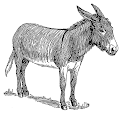REVIEW: Loretta Lynn "Van Lear Rose"
What if you got your grandma a huge plasma screen TV, progressive scan DVD changer with 6-speaker 200 watt stereo surround sound, TiVo and a lifetime subscription to Netflix?
You know exactly what would happen. You'd show up on Saturdays, mow half her lawn then hang out watching The Matrix while she sits smiling politely beside you. After a few hours she'd say "How interesting" and offer you a snack.
The metaphor may be weak but I think I'm in the neighborhood. Jack White of White Stripes glory lends his feedback friendly ear to an album of almost-instant-classics by Butcher Hollow's pride and joy. There are so many reasons why this is a great idea - insert a classic country icon into the resurgent Americana scene, freshen up her fan-base to include tattooed hipsters and generally younger fans, breathe new life into an often predictable Grand Ole sound. Plus it would be fun, right? Lucky fo us it is, and it's good enough to be my pick to win Best Country Album at the Grammies this year.
The sound is generally plugged in, punched up and hung loose - what you'd expect if Jack & Meg played country riffs instead of the sonic blues. But this isn't a Stripes album with special guest Loretta Lynn, make no mistake. Lynn's presence in each song is commanding, as if her voice is her very identity and all else swirls inward toward her. White and company work hard to sound as confident but neither rock'n'roll swagger nor supposed country humility can match true cultural royalty, and her's is on full display. She delivers stirring performances of heart-strung songs that sound like they've been neatly folded in an oak chest all these years - crisp, touching, unfaded and treasured. Some of this poignancy is driven by the spark of collaboration, the friction between new and traditional sounds justifying the project completely. Other times, mostly when Jack sings, it is in detriment. But the whole outweighs the parts and Loretta Lynn carries it all effortlessly. No wonder this album made so many year-end top ten lists.
REVIEW: Of Montreal "Aldhils Arboretum"
If I had the time and profound patience it would take I would listen through my Beatles catalog and find the track these guys pillaged for the album's opening riff just so I wouldn't have to keep wondering "what does this sound like?" every time I hear it. Maybe you know. You're very smart so you might.
Faulting a band for strip-mining the Fab Four's mountain of material would end all popular music as we know it so we'll set that aside. Same goes for the Beach Boys, who are quoted here through warmly addled phrasing, harmonies and orchestration. But really it's the Beatles.
REVIEW: The Books "Lost and Safe"
Rating: 9
Unless you possess the singularly focused mind of an idiot savant or fundementalist nutjob your thoughts (and mine) skitter and bump around, tenuously linked to a vast array of experiences by sense and memory. Even in moments of concentration there lurk tempting tangents to far off ideas. If we look closer at the thought process it seems less logical and efficient than dynamic, surprising and, at times, beautiful. Listening to The Books is like hearing someone think.
"Lost and Safe" is the most musical of their albums to date and the first truly amazing album I've heard all year. Like their previous two LPs, The Books create near minimal, surrealist sound collage from obscure spoken voice tracks and other found-sounds (creaking doors, telephones...) along with their own creations, often heaviliy digitally processed guitars, banjo, strings, percussion and singing. Until now the band hid wizard-like behind a gossamer curtain of guest vocalists and glitched-out ambient quirck-ery. "Lost" actually finds The Books sounding more like a band without dulling their experimental edge. They provide their own, more prominently featured vocals and shift the compositional balance of many songs from technical form to conceptual / abstractly emotional content. And when I say "prominently featured vocals" I mean barely audible sing-speaking of what might as well be passages from art criticism essays or 1940s sci-fi. Still, with the change, albeit subtle, comes a stonger sense of identity both for the album and the band.
If you're starting from scratch with The Books check out the sixth track "An Animated Description of Mr. Maps" (hear it now on their website thebooksmusic.com - click "new books" then "LIVING ROOM"). What sounds like a drum kit with aluminum foil dampers perfectly pounds the speech patterns of a man as he delivers a brief monologue aptly named by the song's title. It's one of those unbelievable "did I just hear that, is that REALLY what they're doing?" moments that has the potential to elevate an obscure genre to pop status. Fear not, die hard art house and indie freaks, the next track "Venice" presents a news recording of Salvador Dali painting "The Lion of Venice" more or less as is.
The resonance of this album doesn't come from its considerable avante-credentials or Nick Zammuto's presence as a soft spoken frontman. The Books reach a deeper, more active place in the mind than the area used to process other music partly because their songs are mostly made of other sounds than music, synaesthetically building harmony from things you're not sure you can hear. The elegantly cross-associative play of samples, music and lyrics also mirrors our thoughts themselves, jumping from one to another on streams of electricity without apparent reason or warning but not without reward. It's as if the songs conatin audible cues meant to activate a music preexistent and fully formed in our minds. The fact that they can do anything remotely like this is pretty amazing. That they can make it stirring, rich and relevant is brilliant.
See also The Microphones, Grandaddy, Rachel's, and the Blue Man Group
Subscribe to:
Posts (Atom)



